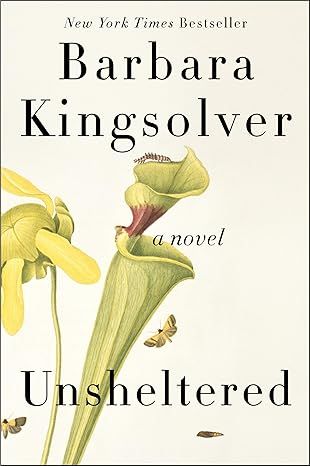Unsheltered: A Novel
4.2 out of 5
12,750 global ratings
New York Times Bestseller • Named one of the Best Books of the Year by NPR, O: The Oprah Magazine, San Francisco Chronicle, Christian Science Monitor and Newsweek
“Kingsolver brilliantly captures both the price of profound change and how it can pave the way not only for future generations, but also for a radiant, unexpected expansion of the heart.” — O: The Oprah Magazine
The acclaimedauthor of The Poisonwood Bible and The Bean Trees, and recipient of numerous literary awards—including the National Humanities Medal, the Dayton Literary Peace Prize, and the Orange Prize—returns with a story about two families, in two centuries, navigating what seems to be the end of the world as they know it. With history as their tantalizing canvas, these characters paint a startlingly relevant portrait of life in precarious times when the foundations of the past have failed to prepare us for the future.
How could two hardworking people do everything right in life, a woman asks, and end up destitute? Willa Knox and her husband followed all the rules as responsible parents and professionals, and have nothing to show for it but debts and an inherited brick house that is falling apart. The magazine where Willa worked has folded; the college where her husband had tenure has closed. Their dubious shelter is also the only option for a disabled father-in-law and an exasperating, free-spirited daughter. When the family’s one success story, an Ivy-educated son, is uprooted by tragedy he seems likely to join them, with dark complications of his own.
In another time, a troubled husband and public servant asks, How can a man tell the truth, and be reviled for it? A science teacher with a passion for honest investigation, Thatcher Greenwood finds himself under siege: his employer forbids him to speak of the exciting work just published by Charles Darwin. His young bride and social-climbing mother-in-law bristle at the risk of scandal, and dismiss his worries that their elegant house is unsound. In a village ostensibly founded as a benevolent Utopia, Thatcher wants only to honor his duties, but his friendships with a woman scientist and a renegade newspaper editor threaten to draw him into a vendetta with the town’s powerful men.
A timely and "utterly captivating" novel (San Francisco Chronicle), Unsheltered interweaves past and present to explore the human capacity for resiliency and compassion in times of great upheaval.
480 pages,
Kindle
Audiobook
Hardcover
Paperback
Audio CD
First published October 14, 2019
ISBN 9780062684738
About the authors
Barbara Kingsolver
Barbara Kingsolver was born in 1955 and grew up in rural Kentucky. She earned degrees in biology from DePauw University and the University of Arizona, and has worked as a freelance writer and author since 1985. At various times she has lived in England, France, and the Canary Islands, and has worked in Europe, Africa, Asia, Mexico, and South America. She spent two decades in Tucson, Arizona, before moving to southwestern Virginia where she currently resides.
Her books, in order of publication, are: The Bean Trees (1988), Homeland (1989), Holding the Line: Women in the Great Arizona Mine Strike (1989), Animal Dreams (1990), Another America (1992), Pigs in Heaven (1993), High Tide in Tucson (1995), The Poisonwood Bible (1998), Prodigal Summer (2000), Small Wonder (2002), Last Stand: America's Virgin Lands, with photographer Annie Griffiths (2002), Animal, Vegetable, Miracle: A Year of Food Life (2007), The Lacuna (2009), Flight Behavior (2012), Unsheltered (2018), How To Fly (In 10,000 Easy Lessons) (2020), Demon Copperhead (2022), and coauthored with Lily Kingsolver, Coyote's Wild Home (2023). She served as editor for Best American Short Stories 2001.
Read more
Reviews
chris a.
5
Beautiful story.
Reviewed in the United States on July 25, 2024
Verified Purchase
Love how it taught me about equity, in new ways. The daughter TIg and her mom are wonderful characters.
Lynn Brylowe
5
Loved it
Reviewed in the United States on July 10, 2024
Verified Purchase
Couldn't put this book down. I'm much more conservative than Kingsolver but I still can relate to her points of view, she writes so well.
Amazon Customer
5
A novel for our times
Reviewed in the United States on January 21, 2024
Verified Purchase
Precarity is a word that seems to have sprung into existence in recent decades as our economy shifts and much that was considered valued, dependable work has disappeared. Kingsolver brings her practiced eye to noticing the ways living on un-firm foundations affects us and our relationships. She contrasts a modern household in a house in the midst of physical demise and questionable future work opportunities with a late 19th century household facing the same problem. It helps one to clarify in what ways "this time is different" and in what ways it is just the same. Enjoyed the commentary on emerging science in Darwin's age, the social commentary of our age, the familial relations, and the rich, marital bond of the contemporary protagonist.
Read more
2 people found this helpful
Garth Hallberg
5
The Lit Biz Eats Its Best and Brightest
Reviewed in the United States on November 19, 2018
Verified Purchase
The American novelist, Barbara Kingsolver, writes stories that encourage readers to think while they’re being entertained. Her novels are concerned with the great social issues of our time, such as global climate change and political turmoil.
Publishers have a variety of names for this genre, as though the lit biz can’t quite get a grip on it—social novel, social justice novel, social protest novel, political novel, the literature of social engagement. Whatever these kind of novels are called, they’re generally viewed with suspicion by critics and editors, who see little or no place for social commentary in “literature” or in sales. Happily, that attitude hasn’t stopped Kingsolver’s books from becoming best sellers, and being shortlisted for such prestigious honors as the Pulitzer Prize and the PEN/Faulkner Award.
Kingsolver’s eighth novel, Unsheltered, was published in October. It’s more overtly political than her previous novels, as well is should be in this Time of Trump. It’s also one of the most entertaining and thought-provoking novels I’ve read in quite some time.
The plot revolves around an educated middle-class couple, a de-tenured academic and a freelance writer, as they attempt to fend off poverty and find satisfaction and fulfillment in their lives, even though they’re trapped in the gig economy and the sandwich generation. (Think boomerang children and aging parents, not mayonnaise.) What could be depressing in other hands is both humorous and enlightening. Gritty truths about how we live in Trump’s America are not Photoshopped away, but nonetheless, the characters and readers are left with a renewed sense of optimism, realistic but real.
So why was Unsheltered savaged by critics in two publications that I read faithfully and respect greatly, the New York Times and the Atlantic? Dwight Garner in the Times wrote that the novel was “dead on arrival,” and that “every other conversation threatens to become an op-ed piece of a humanistic monologue out of lesser John Steinbeck or Arthur Miller.” And those are not the worst things he has to say. Merve Emre’s review in the Atlantic is headlined “Liberal Pabulum,” and goes on to say “Tackling the Trump era, she brings us the American family-novel as Sunday talk show—all sound bite, no depth.”
Trying to get beneath the invective, Garner either has a personal axe to grind or he is simply defending the typical lit biz trope that “a novel isn’t an essay.” I think he’s also guilty of a bubble mentality, the bubble in question being the glamorous and wealthy Big Apple. He singles out for criticism one of the most truthful pieces of dialogue in the book, truthful except for economic outliers like Silicon Valley, Manhattan, and parts of Brooklyn and the New York suburbs: “It just seems like…I don’t know. There’s less money in the world than there used to be. I don’t know how else to put it. Like something’s broken.”
Emre, who may be an American but who teaches at Oxford, picks on the same line of dialogue, but apparently for a totally different reason. She seems to think that Kingsolver has only a superficial understanding of the horror show that is America, writing that Unsheltered “fails so dramatically to capture the corrosive realities of liberal capitalism.” (Perhaps she would have been more satisfied if Kingsolver had written, “there’s no money in the world” rather than “less,” a sad truth for about fifty percent of our citizens.)
Moreover, Emre takes conventional lit biz wisdom a step further, or perhaps she’s trying to explain it, by dismissing novels like Unsheltered, as a “middlebrow fantasy that stories can help us get through these dark times.” In other words, novelists, don’t bother to try.
As a novelist, I despair how the lit biz seems determined to rope fence socially-conscious fiction, pooh-poohing any attempt to deal with the major issues that affect our daily lives, and that will affect the daily lives of our children and grandchildren and their children, assuming the planet is still livable. So its heartening to note that Unsheltered is an Amazon Best Book and a New York Times’ bestseller, reaching as high as #2 on the hardcover fiction list.
It would be a shame if influential reviews like Garner’s and Emre’s start to take their toll in sales. My advice is don’t take their advice. Unsheltered is a really good, meaty read that will not disappoint. Buy it!
Read more
75 people found this helpful
john gilbert
4
Not an easy read
Reviewed in the United States on September 2, 2022
Verified Purchase
Barbara Kingsolver is unlike any other author I know. She is all about social justice and brings up more issues than any other author in America I know. I have read every fiction novel she has ever published, and this is by far the most hard hitting with issues beleaguering America today.
Her early books addressed the North American Native problems of recent times, and she went on to write novels about Protestant missionaries in Africa, Communists in Mexico, survival of coyotes in Appalacia and the dieing out of Monarch butterflies in North America. In Unsheltered she brings out all her guns, addressing in no particular order, a very disfunctional health care system, hard working professional people being screwed over by the system, older people dieing without support, a very bad current political climate (without mentioning Trump by name) but villifying the system that saw his elected, climate change, airline travel (a funny but real story of travelling between two very large people in a domestic flight of 7 hours in a middle seat) and just what happens when anyone challenges the current status quo.
This book is about a family in present day, where two professional qualified parents who believed in the dream are screwed over. The story goes back and forth to Vineland in New Jersey, established in the mid 1800's by a man named Landis, where all was promised in his Christian utopian vision, but if he was challenged, watch out. Our main character in this portion is a school science teacher who happens to believe in Darwin against the then total christian dogma of dismissing science (which obviously ties into todays anti science bent by many).
For me, the best parts are in the dialogue between the modern day mum and her daughter Tig, who has rebelled against the current status quo, from achievers to over consumption and the breakdown of modern American society. After spending time in Cuba, she exaults in living with less, helping each other and not believing in the American dream of success. Although the mum is university educated and cognisant of the current pitfalls of the existing unfairness she experiences, she still believes in the dream, with her husband, a university professor who has been screwed by the system and still believes in it.
This is not an easy read by any means. The story by changing between epochs is sometimes disconcerting and difficult, but her message is clear. America today is not well and if it keeps on in the same way, many or all will suffer terribly as climate change, over consumption and dismissal of science will damn us all.
Read more
40 people found this helpful
Dave Schwinghammer
4
Willa and Thatcher, separated by a century and a half, both unsheltered
Reviewed in the United States on December 1, 2018
Verified Purchase
UNSHELTERED is set in two different centuries at the same address. The house had foundation problems in both centuries and was falling down.
In the 21st century around the time Trump was campaigning for present, Willa Knox had lost her job as a magazine writer and was freelancing. Her husband, Iano, has finally found tenure as a college professor, but the college is in danger of closing and wants to sign him on a yearly basis. It's up to Willa to sell an article for a decent price to fix the house. Her daughter Tig (Antigone), all four feet ten inches, eighty pounds of her is twenty-six and could care less about money; she works as short order cook with her boyfriend, Jorge. She had suddenly appeared after being missing for several years. She was in Cuba embroiled in a romance with a married man. We learn a lot of good things about Cuba that our propaganda stations don't tell us. Education is free right on through Phd, for instance. If you need a ride anyplace, you go up to this guy wearing a yellow coat, who will find somebody to take you, usually stopping a car that's not fully occupied and asking where they're going. Willa's other child, Zeke, is a financier, trying to set up a hedge fund, but he's down in the dumps, as the mother of his child, Dusty, has committed suicide; she just never wanted a baby. Both Willa and Tig want Dusty. Zeke has yet to bond with the kid.
In the 19th century, Thatcher Greenwood is in his first year as a science teacher, trying to make it relevant to kids who could care less. But his main problem is his principal who will interrupt his class at any time and go into a religious rant, attacking science, usually Charles Darwin's contention that we evolved from apes. His wife, Rose, is into horses and the rich Dunwiddle family who let her ride their horses. Her little sister, Polly, is smitten with Thatcher and thinks he should marry her. She's just a teenager, though. The villain of this part of the story, besides the principal, is the town dictator, Landis who will remind you a lot of Henry Ford and other model city tyrants like Pullman who created working class homes for their employees, charged them rent and set up a whole string of requirements and rules you had to conform to if you wanted to live there, including periodic inspections. Landis also owned a lecture hall; he would bring in speakers for the edification of the townspeople at fifteen cents a pop. That's how Thatcher and his principal got involved in a debate on Darwin's evolutionary theory, which sealed his fate as a teacher. Thatcher did have one ally, a Mr. Carruth, who ran a newspaper critical of Landis's heavy-handed ways and of his ailing wife. That's where the climax for that part of the story arrives. Landis runs his own newspaper, which is highly complimentary of Landis's doings. Landis hates Carruth. What will he do about the insult (satirical though it is) to his wife and will he get away with it? I think we can see why the book is entitled UNSHELTERED and not only because both houses are falling down.
Read more
10 people found this helpful
Megan Clancy
4
A beautiful story with a lot going on
Reviewed in the United States on May 19, 2019
Verified Purchase
Summary: Willa Knox, a middle-aged woman finds herself in a situation she never thought she would have to deal with. An unsteady marriage, an ailing father-in-law, and two grown children living at home, one returning with his newborn son after the death of his wife. And they are all living in a house that is falling apart. Willa desperately begins researching the history of her home in hopes that it’s age or historical significance could provide the family with a grant to keep the roof over their heads. In her research, she comes across a kindred spirit in an 1880s resident of the home, Thatcher Greenwood. In his own time, Thatcher is a science teacher dealing with the struggles of a miserable home life and working in a school where he is forbidden to discuss the new theories of Darwin with his students. But then, a friendship with a neighboring female scientist, one who is in direct communication with Darwin himself, provides a new spark in his life. It is the story of two families in two very different ages searching for shelter in very uncertain times.
Review: Unshletered is a beautiful story written by one of the more superior writers of our time. But there is so much going on in this book. Kingsolver’s writing is gorgeous, as always and she excels here at creating two very vivid worlds. I immediately sympathized with Willa and understood her struggles. It did, however, take a little longer into the 1880s portion of the story to truly understand how I was supposed to relate to the different characters. And even after it was established that Thatcher is the character of focus in that timeline, I was conflicted over my feelings toward him. He does have several faults and does not always behave in a completely immaculate manner. Whereas Willa, while not flawless (although this would not be desired and would be a bit unrelatable), does seem to be the moral center of her family and the clear character to root for. Very early on, the reader is shown how these two worlds connect, through the house that serves as the residence of the two main characters, but it takes much longer for the deeper comparisons and message to come to light. This is a story that I’m sure I could read multiple times and get a little something different out of each reading. Through these characters, Kingsolver seems to offer hope in troubling times, both past and present.
Read more
4 people found this helpful
Martie Nees Record
4
Kingsolver does it again. Great read.
Reviewed in the United States on December 12, 2018
Verified Purchase
Genre: Family Sagas/Historical Fiction Publisher: HarperCollins Pub. Date: October 16, 2018
Barbara Kingsolver is a powerhouse of a writer and one of my preferred authors. “Poisonwood Bible” remains a favorite book of mine. In her latest novel, she sticks with her familiar themes—environment, religion, and social issues. The setting goes back and forth between America’s current troubles to America’s troubled past. In the present, we meet a fictional college-educated, middle-class family who live in the real-life city of Vineland, NJ. To their shock, a few career setbacks and an ailing parent's medical bills have caused a downgrade in their economic status. Kingsolver is at her best when asking “how could this have happened to us?…we did everything right.” She makes it easy to realize that your life too could turn on a dime. To add to the family’s woes, their centuries-old house is literally crumbling around them. Willa, the family matriarch, has learned that their house may have once been the home to real-life Mary Treat. Treat was a self-taught naturalist and correspondent with Charles Darwin. Willa begins to write a historical preservation grant in hopes that the grant will pay for the house renovations.
In the past, Kingsolver takes us back to when Mary Treat was a working naturalist, which was immediately post civil war. Her reasons for this time period are clear and very clever. The troubles for the family in current times begin when Trump announced he was running for president. Donald Trump’s name never appears in the novel but it is clear that he is “the Bullhorn…who promises to restore the old order…the billionaire running for president who’s never lifted a finger in work…the candidate who brags that he could stand in the middle of Fifth Avenue and shoot somebody, and people would still vote for him.” The past is my favorite part of the book since it is such a classroom experience without the homework assignments. I was fascinated to learn that back then, Vineland was created to be a utopian community. It was founded by nonfictional Charles Landis. He was a Trumpian-like real estate developer who really did shoot someone in the middle of the street and get away with it. Landis had a strong dislike for Darwin since the opinion of the times was that Darwin was threatening religious beliefs. He did not want Darwin’s theories, or any already proven scientific facts to be taught in Vineland’s schools. Sounds familiar right? Trump’s (so-called) Christian anti-science moves are spelled out loud and clear. In an interview with Kirkus Reviews, Kingsolver states, “I chose the 1870s as my alternate world because I knew it was a really difficult, polarized moment in our history…..Racial divisions, urban/rural divisions, North/South divisions—those rifts were ripped open by the Civil War.”
I left out reviewing a few very good subplots for they would be spoilers. Between the alternating timelines, I preferred the story in the past. The present-day timeline borders on preachy. How we long for careers that ultimately fail to bring happiness or sometimes not even financial stability. How spoiled we can be. How we want and waste. All true, but no one likes a lecture in the middle of a story no matter how much you may like the plot and the characters. Oddly, the past felt fresh. I enjoyed reading about young America’s growing pains. How hard the scientific minds had to fight to be heard. I do have a rather petty criticism on the writing. The words “sheltered” and “unsheltered” come up repeatedly. It felt as if Kingsolver didn’t think her audience capable of making the connections. I don’t believe that in her book ‘Poisonwood Bible,’ (which is about a missionary family in the Belgian Congo) the title words pop up at all. She trusted that her readers would make the connection that, like a poisonwood tree, religion too can become dangerous when mishandled. This does not mean that I didn’t enjoy “Unsheltered,” for I very much did. And, will not think twice about recommending the book. As usual, Kingsolver gives her readers plenty to wonder about. In this novel, she does an amazing job of penning an engaging story about human existence combined with a well-researched tale on past and present American politics.
Read more
37 people found this helpful
Joseph J. Truncale
3
I did not find this historical political novel to be a compelling read.
Reviewed in the United States on June 25, 2023
Verified Purchase
First off, this type of novel is definitely not my usual reading interest; however, I do sometimes read historical type of novels and this book was given to me, and so I decided to read it. This 464-page soft cover book (Unsheltered: A novel by Barbara Kingsolver) is about two different families in two different centuries, but who have similar problems. They must deal with a range of common issues when it comes to family, careers, jobs, making a living, and of course health issues.
It is also somewhat political, and it is clear the author has far left collectivist philosophical views, which for me makes for an unenjoyable anti-intellectual read; nevertheless, since most of our present-day American society has clearly been convinced (some would say brain-washed) that American historical traditional values are evil, but socialist philosophy (in spite of its failure around the world) is superior to our constitutional republic of freedom and capitalism. I am sure this book will appeal to those with the same political philosophy.
I did not find this to be a compelling read and I do not plan on reading any other novels by this author. Finally, I am being generous by giving this historical political novel 3 stars. Rating: 3 Stars. Joseph J. Truncale (Author: Never trust a politician: A critical review of politics and politicians).
Read more
14 people found this helpful
Sherril S-K
3
Not Kingsolver’s Best But Good Enough
Reviewed in the United States on January 23, 2019
Verified Purchase
Unsheltered by Barbara Kingsolver is not, in my opinion, one of her best books. Far and away, her best book was The Poisonwood Bible. In Unsheltered it took me the first 100 pages or so to properly get into it and once into it, I favored the storyline which took place in the late 1860’s, after the Civil War. Initially, I preferred the modern day story of Willa, a journalist in the present era when newspapers and magazines are giving way to the internet and her husband, Iano, an untenured professor unsuccessfully chasing a tenured college position. They are a family who has done everything right, but still, the American Dream has alluded them. And on top of everything, their house, which they inherited, was coming down around them. “Willa’s house was brick. Not straw or sticks, not a thing to get blown away in a puff.”
The historical story was richer and more compelling. It tells about Thatcher Greenwood and the real life character, Mary Treat, a 19th century biologist. Many of the characters and events in this part of the book are real and quite interesting to learn about. For example, who knew that though women got the right to vote in 1920 with the 19th amendment, in 1868 the women of Vineland voted in the presidential election. Vineland, NJ, the location of the novel both in the 1860’s and the present, is in and of itself, a character in both stories. “So he named it Vineland thinking people would swarm around like fruit flies?” Others who make their way into the historical part of the book, with significance are Charles Darwin, Charles Landis, the land baron of Vineland, Asa Gray, famous botanist of the day and even Ulysses S. Grant.
The novel’s two sections are intertwined by having Willa, in current day, pursue the possibility that Mary Treat had lived in their house, which would have made it valuable as an historic landmark. Kingsolver also weaves the two stories together by ending one chapter with a word that will be the title of the following chapter. For example the first chapter of the book has Willa’s son, Zeke diapering his new baby, soon after having lost his wife to suicide, saying to the baby, I’m lousy at this, buddy. You have to bear with me. I’m a rank beginner here. You’re not lousy, Willa said quietly. We’re all beginners here. Chapter two, “Beginners”, is about Thatcher and his new wife, Rose beginning their new married life along with Rose’s sister, Polly and mother, Aurelia in a house with structural problems. Across the way, the look onto the property of Dr. and Mrs. Treat, commenting on how the husband had deserted his wife for a suffragette woman.
The book takes on larger political, scientific and environmental issues (“She ((Willa)) was homesick for the blue mountains and veiled horizons of their lost college town, and with an older ache, for the steep hills of her childhood, even if they’d mostly been turned into coal-tipped wasteland now.) and controversies of the 1860’s that remain with us till this day: evolution, survival of the fittest, religion vs science, environmental degradation. Though not mentioned by name, Donald Trump, is front and center in current day, Willa’s story. What becomes evident in the novel is that the more things change, the more they stay the same. For example are these quotes from the late 1860’s or 2018? “I’m afraid I am stuck with the rear guard. Cutler is an old authority. Men like him dread new views, for fear they’ll have to set aside their hard-earned credentials and begin their climb again at the bottom rung.” Or how about this one? “in this impossible town where even the trees are bullied into conformity.” Or this? “marveled at his capacity to live a life undisturbed by actual evidence.” I’ll let you guess.
I recommend Unsheltered, but if Barbara Kingsolver is new to you, first read her novel The Poisonwood Bible, so you will know her writing at its best.
I will end with the title. The words sheltered and unsheltered appear throughout the book, but the example I liked the best was, “Unsheltered, I live in daylight. And like the wandering bird I rest in thee”.
Read more
14 people found this helpful
Top Barbara Kingsolver titles
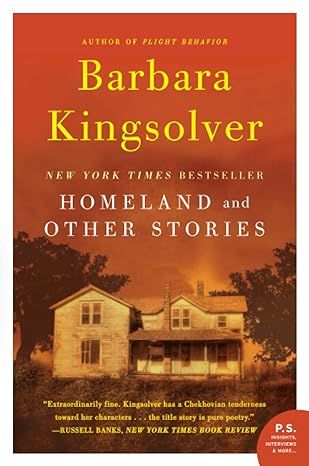
Homeland: And Other Stories
4.2
-
691
$5.24
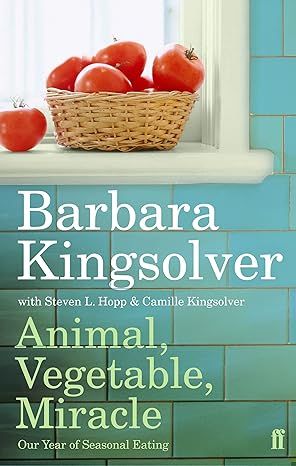
Animal, Vegetable, Miracle: Our Year of Seasonal Eating
4.5
-
2,496
$7.96
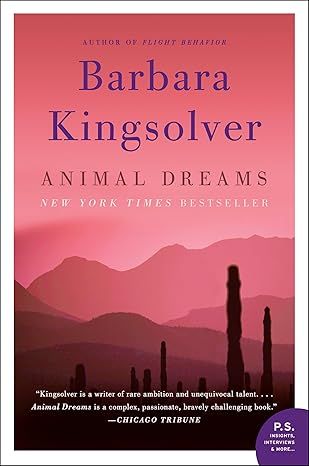
Animal Dreams: A Novel
4.4
-
2,888
$10.49
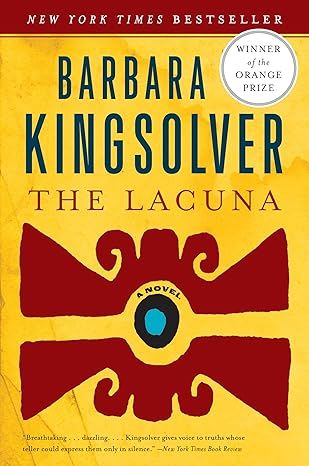
The Lacuna: A Novel (P.S.)
4.4
-
4,450
$1.77
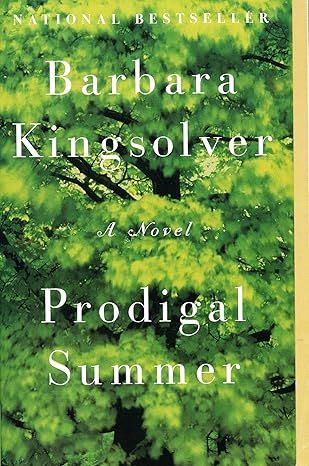
Prodigal Summer: A Novel
4.4
-
6,309
$8.99
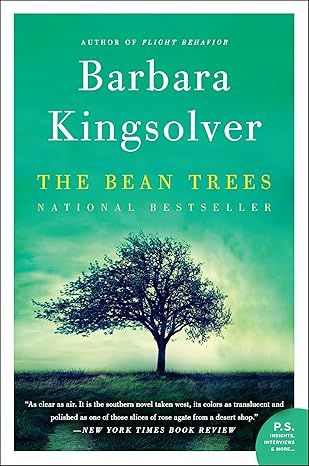
The Bean Trees Anniversary Edition: A Novel
4.4
-
11,504
$2.41
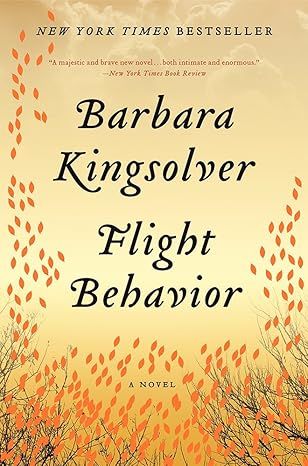
Flight Behavior: A Novel
4.3
-
9,479
$1.84
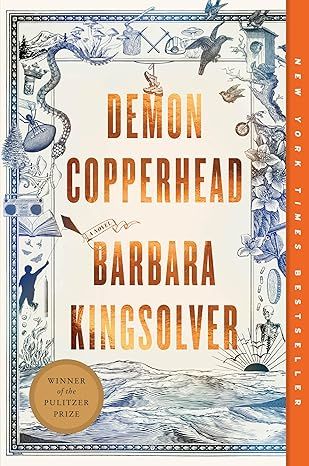
Demon Copperhead: A Novel
4.6
-
110,129
$16.99
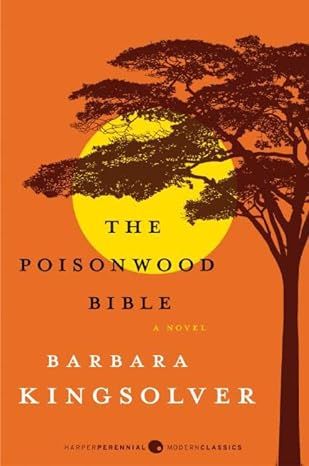
The Poisonwood Bible: A Novel
4.5
-
16,256
$12.69
Best Sellers

The Tuscan Child
4.2
-
100,022
$8.39

The Thursday Murder Club: A Novel (A Thursday Murder Club Mystery)
4.3
-
155,575
$6.33

Sapiens: A Brief History of Humankind
4.6
-
140,302
$13.49

The Butterfly Garden (The Collector, 1)
4.3
-
88,556
$9.59

Things We Hide from the Light (Knockemout Series, 2)
4.4
-
94,890
$11.66

The Last Thing He Told Me: A Novel
4.3
-
154,085
$2.99

The Perfect Marriage: A Completely Gripping Psychological Suspense
4.3
-
143,196
$9.47

The Coworker
4.1
-
80,003
$13.48

First Lie Wins: A Novel (Random House Large Print)
4.3
-
54,062
$14.99

Mile High (Windy City Series Book 1)
4.4
-
59,745
$16.19

Layla
4.2
-
107,613
$8.99

The Locked Door
4.4
-
94,673
$8.53
